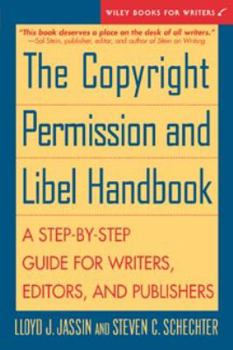The Copyright Permission and Libel Handbook: A Step-By-Step Guide for Writers, Editors, and Publishers
Select Format
Select Condition 
Book Overview
"A thoughtful, comprehensive, and invaluable guide for writers."--Bernard Lefkowitz, Professor, Columbia University Graduate School of Journalism "Easy to read and understand . . . should be on every... This description may be from another edition of this product.
Format:Paperback
Language:English
ISBN:0471146544
ISBN13:9780471146544
Release Date:November 2010
Publisher:Wiley
Length:224 Pages
Weight:0.70 lbs.
Dimensions:0.6" x 6.0" x 9.0"
Customer Reviews
5 ratings
clear and to the point
Published by Thriftbooks.com User , 24 years ago
While preparing to publish my second book (with number 3 on the way) I realized I needed some basic information about publishing and libel law. I found a copy of this book in the reference section of the law library at my university. The sections on libel were concise and to the point. I have not compared the book to other sources, but found it was very clear on the issues of importance to me. I've decided to order a copy to keep for reference, and I think it would be useful to most writers.
Most Writers have two Copyright Questions
Published by Thriftbooks.com User , 24 years ago
(From my book Successful Nonfiction: Tips and Techniques for Getting Published)1. How can I guard against others stealing my writing?Relax. The moment you create a written Work, it is automatically copyrighted under Common Law. Once the book is published, you may send two copies to the Copyright Office with the two-page Form TX and $30 to register or perfect your copyright. Some (new) authors copyright their manuscript. Later, when they turn it into a book, they print the original copyright date. This makes the book appear to be old, and that hurts sales. Most authors wait and send the finished book to the Copyright Office for registration.... A registered copyright only gains the author some extra rights. The difference is between copyright and registered copyright, not between not copyrighted and copyrighted. Copyright occurs automatically with creation-when you initially write it. Publishers rarely steal manuscripts. They are in the publishing business not the writing business. Manuscripts are cheap and publishers do not even have to pay the authors until months after the books are sold. There is little incentive to rip you off. "The instinct of ownership is fundamental in man's nature." -William James (1842-1910), American philosopher and psychologist. 2. How much may I borrow from others?Borrow ideas, borrow facts, but do not steal words. Copyright covers the author's presentation or expression-a sequence or pattern of words. It does not protect ideas. If you read and blend the ideas of other authors and put the collective thought into your own words, that is perfectly legal. This is how most nonfiction books are written-from research. Do not repeat any of the research materials word-for-word. Some of the material is not yours so copying could be plagiarism and you would be guilty of copyright infringement. Adapt the ideas from many sources so that your work is not substantially similar to any of them. In Feist Publications, Inc. v. Rural Telephone Service Company, Inc., 111 S.Ct. 1282, 1287-88 (1991), the court held that the listings (facts) in a telephone directory were not protected by copyright. Facts may not be copyrighted either; they are free for anyone to repeat or use in a manuscript. "Copy from one, it's plagiarism; copy from two, it's research." -Wilson Mizner, screenwriter.The Copyright Permission and Libel Handbook is divided into two parts: the first covers copyright and the second covers libel (written defamation). For coverage, click on Table of Contents in the left-hand column of this page. The appendix has sample copyright forms, disclaimers and resources. Lloyd Jassin is a book attorney. Before becoming a lawyer, he was Director of Publicity for Simon & Schuster Reference Group.Steven Schechter practices media and publishing law and teaches media law topics. As a publisher and an author of 113 books (including revisions and foreign-language editions) and over 500 magazine articles, I highly recommend this reference to
Outstanding primer for publishers and writers
Published by Thriftbooks.com User , 25 years ago
Presents clear, lucid overview of the many trickly and, potentially toublesome, legal issues in using another's copyrighted work. The libel discussion is equally clear and lucid. Quesion and answer format is a plus.Contains no legalize as it written expressly for nonlawyer. Highly recommmended for both publishers and writers.
A bargain--reasonably priced and loaded with relevant info!
Published by Thriftbooks.com User , 26 years ago
This handbook provides a comprehensive overview and useful explanations of copyright, fair use, permission releases, and libel. It's well-organized and easy to read. Helpful summary checklists are provided at the end of key chapters. The book is a good resource for authors to have in their reference collections. It's a bargain--reasonably priced and loaded with relevant information.
Practical help and thoughtful commentary
Published by Thriftbooks.com User , 27 years ago
The lucid explanations of every aspect of a subject that confounds many make this book an indispensable tool for publishing professionals, writers and students. Loaded with practical help and thoughtful commentary





